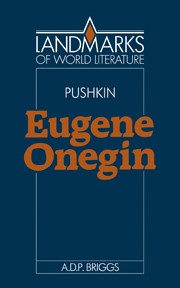Book contents
- Frontmatter
- Contents
- Preface
- Note on translations and references
- Chronology
- Chapter 1 The poetry of Eugene Onegin
- Chapter 2 Shades of unreality
- Chapter 3 The unreal reputations of Eugene Onegin and Tatyana Larina
- Chapter 4 Olga, Lensky and the duel
- Chapter 5 It is in verse, but is it a novel?
- Guide to English translations and further reading
- Frontmatter
- Contents
- Preface
- Note on translations and references
- Chronology
- Chapter 1 The poetry of Eugene Onegin
- Chapter 2 Shades of unreality
- Chapter 3 The unreal reputations of Eugene Onegin and Tatyana Larina
- Chapter 4 Olga, Lensky and the duel
- Chapter 5 It is in verse, but is it a novel?
- Guide to English translations and further reading
Summary
The most important event in the story of Eugene Onegin occurred at nine o'clock on the morning of 21 January 1821 when a boy of eighteen was shot dead in a duel. His victorious opponent was a mature man of twenty-five and an experienced duellist. The circumstances of the duel had been manipulated in the older man's favour. It was the offended party, Vladimir Lensky, who died – not the offender, Eugene Onegin.
The facts are clear. Onegin not only caused the duel, unprovoked, but carried it through ruthlessly, having been like a cheat and a murderer. Why, then, has he been treated so lightly by almost all the critics who have written about him? Why are they so ready to explain his conduct in terms of external circumstances bearing upon him and diminishing his guilt? Why do some people even forget that a duel took place, believing that the unsuccessful relationship between Onegin and Tatyana is all that matters in this story? This book addresses these questions and, in view of the answers to them, attempts a reappraisal of all the main events and characters.
Eugene Onegin is not just a novel; it is a novel written in poetry of the highest quality. An explanation is given of the ‘Onegin stanza’, and two such stanzas are examined in detail. Pushkin's role as a linguistic and literary innovator is also described.
Finally, this novel is placed in its literary-historical context.
- Type
- Chapter
- Information
- Alexander Pushkin: Eugene Onegin , pp. viiPublisher: Cambridge University PressPrint publication year: 1992



